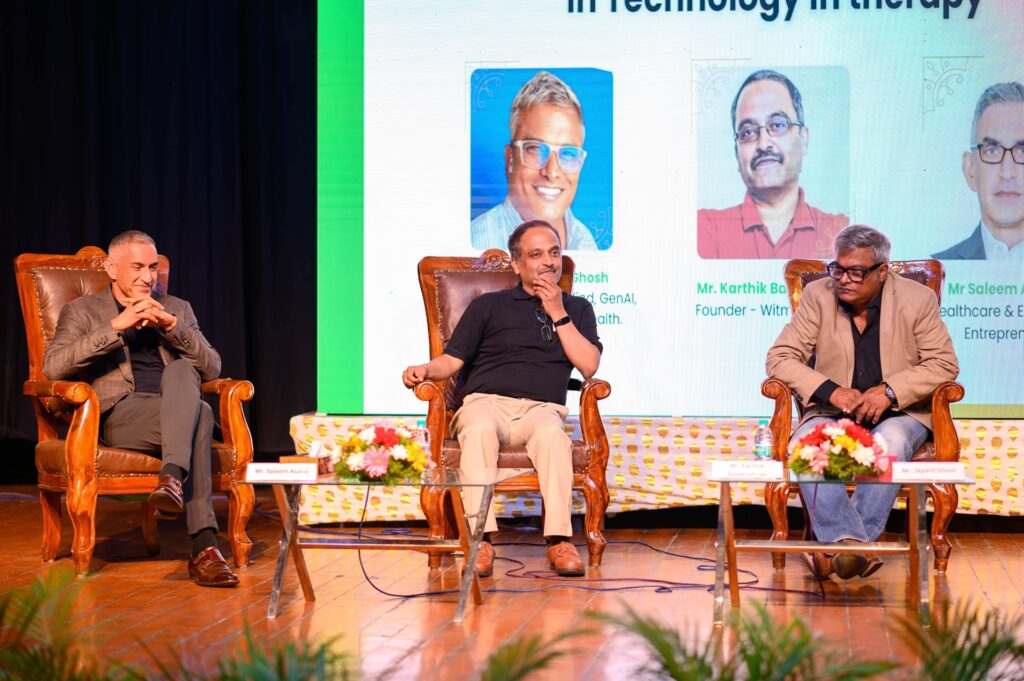
In today’s rapidly evolving world, mental health has emerged as a critical area of concern, particularly in the wake of global events like the COVID-19 pandemic. As individuals and communities grapple with unprecedented challenges, the need for accessible, effective, and innovative mental health support has never been more pronounced. In a recent panel discussion focused on the intersection of technology and mental health care, expert panelists shared valuable insights and perspectives on how technology can transform the landscape of mental health support. Through their diverse experiences and expertise, the panelists shed light on the transformative potential of technology in revolutionizing mental health care, offering hope for a brighter future in mental health support.
Transitioning from the broader context of mental health challenges to more personalized insights, let’s delve into the perspectives shared by each panelist.
Mr. Jayanth Ghosh’s Insights:
- Addressing Mental Health Challenges:
- Reflects on the prevalence of mental health challenges post-COVID within his social circle.
- Acknowledges a historical method of addressing mental health issues with physical force but emphasizes the need for a more supportive approach.
- Motivation for Technology:
- Identifies a gap between demand and supply in mental health support.
- Recognizes the potential of technology to enhance mental health care.
- Discusses the formation of Trintune Mind, a company aimed at leveraging technology in mental health.
- Benefits of Technology:
- Introduces technology as a supportive companion in mental health.
- Describes technology’s role as a listener providing direction, especially in challenging beliefs or thoughts.
- Highlights technology’s assistance in diagnosis, particularly in stress-related scenarios.
- Mentions the potential of virtual reality and AI in enhancing mental health support.
- Explains how technology can track and support individuals throughout their mental health journey.
- User Requirements and Functionality:
- Outlines user requirements for utilizing technology in mental health, emphasizing comfort with facing a camera and effective communication.
- Clarifies that technology operates independently without direct user input.
- Illustrates a scenario where technology assists in identifying the need for counseling and provides feedback to therapists.
- Contrast the approach of mental health support with traditional healthcare, emphasizing a non-medication-based approach.
Mr. Karthik Balakrishnan’s Perspectives:
- Personal Experience:
- Shares his personal experience of living with and fighting OCD for over three decades.
- Highlights the internal struggles faced by individuals with mental health conditions, despite appearing happy-go-lucky externally.
- Views on Technology:
- Expresses both trepidation and optimism towards technology’s role in mental health.
- Cites concerns about its negative impacts while recognizing its potential to unravel the mysteries of the mind.
- The Five A’s and the Five C’s:
- Outlines five key ways in which technology can contribute to mental health support, categorized as the “Five A’s”: awareness, accessibility, affordability, accuracy of diagnosis, and appropriateness of treatment.
- Introduces the “Five C’s” as another framework, Client concern, client comfort, informed consent, confidentiality, and competency in integrating technology into mental health services.
- Seeking Balance and Competency:
- Emphasizes the importance of finding a balance between technology and the human touch in mental health services.
- Urges professionals to stay abreast of technological developments and advise patients accordingly.
Mr. Saleem Asaria’s Contributions:
- Personal Journey:
- Shares his journey from medical school to establishing a successful behavioral health business in Europe.
- Highlights personal tragedies and intellectual curiosity as driving factors in his journey.
- Understanding the Brain:
- Provides insights into the complexity of the human brain.
- Raises concerns over the global prevalence of untreated behavioral health conditions and the need for effective intervention.
- Integration of Technology and Mental Health:
- Addresses the divide between traditional clinical approaches and emerging technological solutions in mental health.
- Advocates for a collaborative effort between technology and clinical expertise.
- The Role of Technology and Human Connection:
- Reflects on the impact of technology on mental health.
- Advocates for leveraging technology to foster resilience and facilitate human connections.
- Emphasizes the importance of maintaining human insight and empathy in mental health care.
Conclusion:
The discussion highlights the evolving role of technology in mental health care. While technology presents opportunities for innovation and support, it also poses challenges and raises ethical considerations. The speakers advocate for a holistic approach to integrating technology into mental health care, emphasizing collaboration, competency, and ethical considerations. They highlight the potential of technology to enhance mental health support while acknowledging the importance of maintaining human connections and addressing individual needs.
The panelists extended their sincere gratitude to Ms. Priyanka, Founder and Psychologist at Inspiron Psychological Well Being Centre, and her team for organizing the conference and for their dedication to advancing psychological well-being through the integration of technology and psychology.




